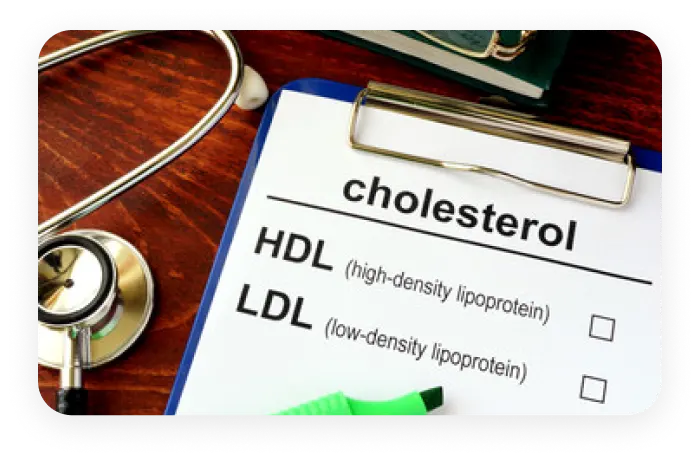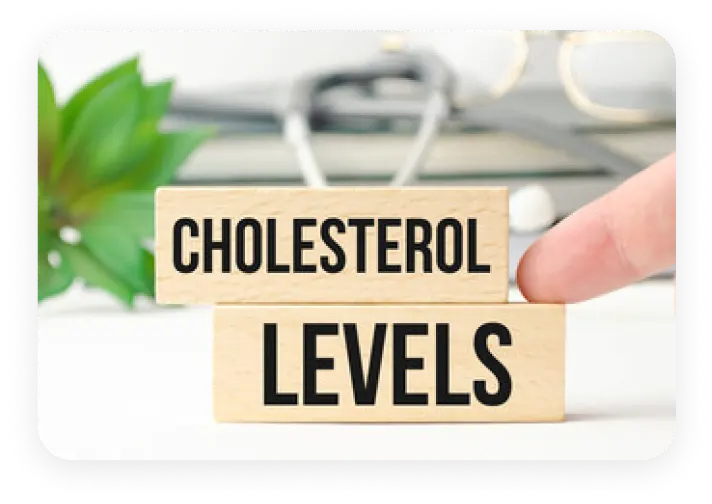High Cholesterol
Did you know?
High cholesterol is a significant risk factor for heart disease, the leading cause of death in the United States? According to the Centers for Disease Control and Prevention (CDC), approximately 93 million adults in the United States aged 20 or older have total cholesterol levels higher than 200 mg/dL, which is considered borderline high risk. Of these, about 29 million adults have total cholesterol levels higher than 240 mg/dL, placing them at significantly higher risk for heart disease.
Cholesterol serves as a crucial building block in the body, being a type of lipid essential for various functions. Produced naturally by the liver, cholesterol plays a pivotal role in forming cell membranes, synthesising certain hormones, and aiding in the production of vitamin D. However, due to its inability to dissolve in water, cholesterol requires transportation through the bloodstream with the assistance of lipoproteins, which are produced by the liver.
Types of Cholesterol
LDL (low-density lipoprotein)
Commonly referred to as "bad" cholesterol, LDL can accumulate in arterial walls, leading to the formation of plaque. This buildup can restrict blood flow and elevate the risk of heart disease.
HDL (high-density lipoprotein)
Known as "good" cholesterol, HDL is believed to aid in the removal of excess LDL cholesterol from the body, potentially reducing the risk of heart disease.

Ideal cholesterol levels vary based on individual factors, particularly the risk of heart disease
- Total cholesterol level: Typically, a level below 200 mg/dL is considered optimal, although the balance between HDL and LDL levels is also crucial.
- LDL cholesterol levels: For most individuals, keeping LDL levels below 130 mg/dL is recommended, although this target may vary depending on individual risk factors.
- HDL cholesterol levels: Higher levels of HDL, ideally 60 mg/dL or above, are associated with a reduced risk of heart disease.
- Triglycerides: Levels below 150 mg/dL are considered optimal for reducing the risk of heart disease.
Monitoring and managing cholesterol levels in accordance with these guidelines can significantly contribute to heart health and overall well-being.
Causes for High Cholesterol
Several factors can contribute to elevated levels of bad cholesterol
- Poor diet: Consuming foods high in saturated fats (found in animal products) and trans fats (found in processed snacks and baked goods) can increase cholesterol levels. Foods rich in cholesterol, such as red meat and full-fat dairy products, also contribute to elevated cholesterol levels.
- Obesity: Individuals with a body mass index (BMI) of 30 or higher are at greater risk of high cholesterol.
- Lack of exercise: Regular physical activity helps raise HDL ("good") cholesterol levels and modifies the composition of LDL ("bad") cholesterol particles, making them less harmful.
- Smoking: Cigarette smoking damages blood vessel walls, making them more susceptible to fatty deposits. Smoking can also lower HDL cholesterol levels.
- Age: As individuals age, changes in body chemistry may lead to an increased risk of high cholesterol. For example, the liver may become less efficient at removing LDL cholesterol with age.
- Diabetes: High blood sugar levels associated with diabetes contribute to elevated levels of very-low-density lipoprotein (VLDL) cholesterol and lower levels of HDL cholesterol. High blood sugar also damages arterial linings, exacerbating cholesterol-related issues.
Ways to reduce the high cholesterol levels in your body
- Follow a low-sodium diet rich in fruits, vegetables, and whole grains, which can help reduce cholesterol levels.
- Limit consumption of animal fats and incorporate healthier fats in moderation.
- Maintain a healthy weight by losing excess pounds through a balanced diet and regular exercise.
- Quit smoking to improve cholesterol levels and overall heart health.
- Engage in regular physical activity for at least 30 minutes most days of the week to help manage cholesterol levels.
- Drink alcohol in moderation or avoid it altogether, as excessive alcohol consumption can contribute to high cholesterol.
- Manage stress through techniques such as meditation, deep breathing exercises, or hobbies that promote relaxation.

Treatment and Options in Clearwater, Seminole and Palm Harbor At All Care
By incorporating these lifestyle changes, individuals can take proactive steps to maintain healthy cholesterol levels and reduce their risk of heart disease. Schedule an appointment with us today as we believe,
"A healthy heart is a happy heart. Take steps to lower your cholesterol and improve your well-being."
Get Yourself Checked Now





